Best solar panels in 2025: Which one should you choose?
After reviewing thousands of solar panels, we found that Maxeon offers the best solar panels.
By Casey McDevitt, Emily Walker
Updated July 3, 2025

Choosing the best solar panel can feel overwhelming, but it's easier than you think. A quality solar installer will typically install quality solar panels, so your main focus should be choosing the best solar installer for the job—your installer's experience and your solar system's size have a bigger impact on effectiveness. Still, every home is different, and most will benefit from having the most efficient panels on the market.
However, timing is critical: The 30% residential solar tax credit is currently set to expire at the end of this year, and equipment shortages are already affecting the availability of top-tier solar panels. While the panels ranked below represent the absolute best performance available, securing the 30% federal tax credit should be your top priority. If your preferred high-ranking panel isn't available or causes project delays, choosing a slightly lower-ranked but readily available panel is often the smarter financial move—the ITC savings will likely outweigh the small performance difference.
To find the best solar panels, we analyzed thousands of models from hundreds of manufacturers featured on the EnergySage Marketplace. We compared key factors like efficiency, power output, performance in warmer temperatures, and warranty coverage.
Five brands stood out: Maxeon, VSUN, REC, Qcells, and Canadian Solar.
EnergySage Equipment Rating System
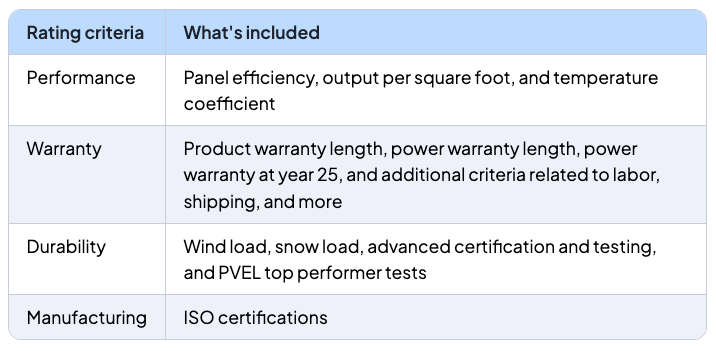
What are the best solar panels?
Based on our analysis, Maxeon offers the best solar panels, followed by VSUN, REC, Qcells, and Canadian Solar. Each scored well overall, but the best one for you depends on your home’s specific needs.
Choosing the highest quality solar panels will likely mean a higher upfront cost, but it's often worth it in the long run. With higher efficiency, output, and longer lifespans, solar panels from these five brands will maximize your savings.
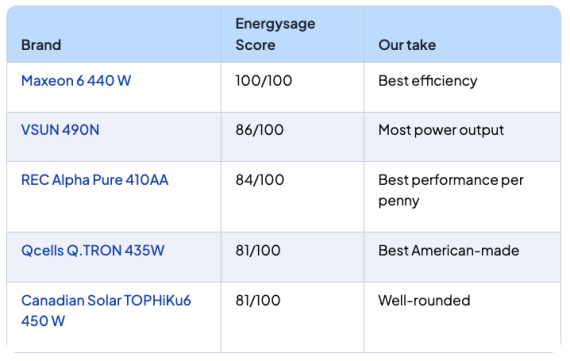
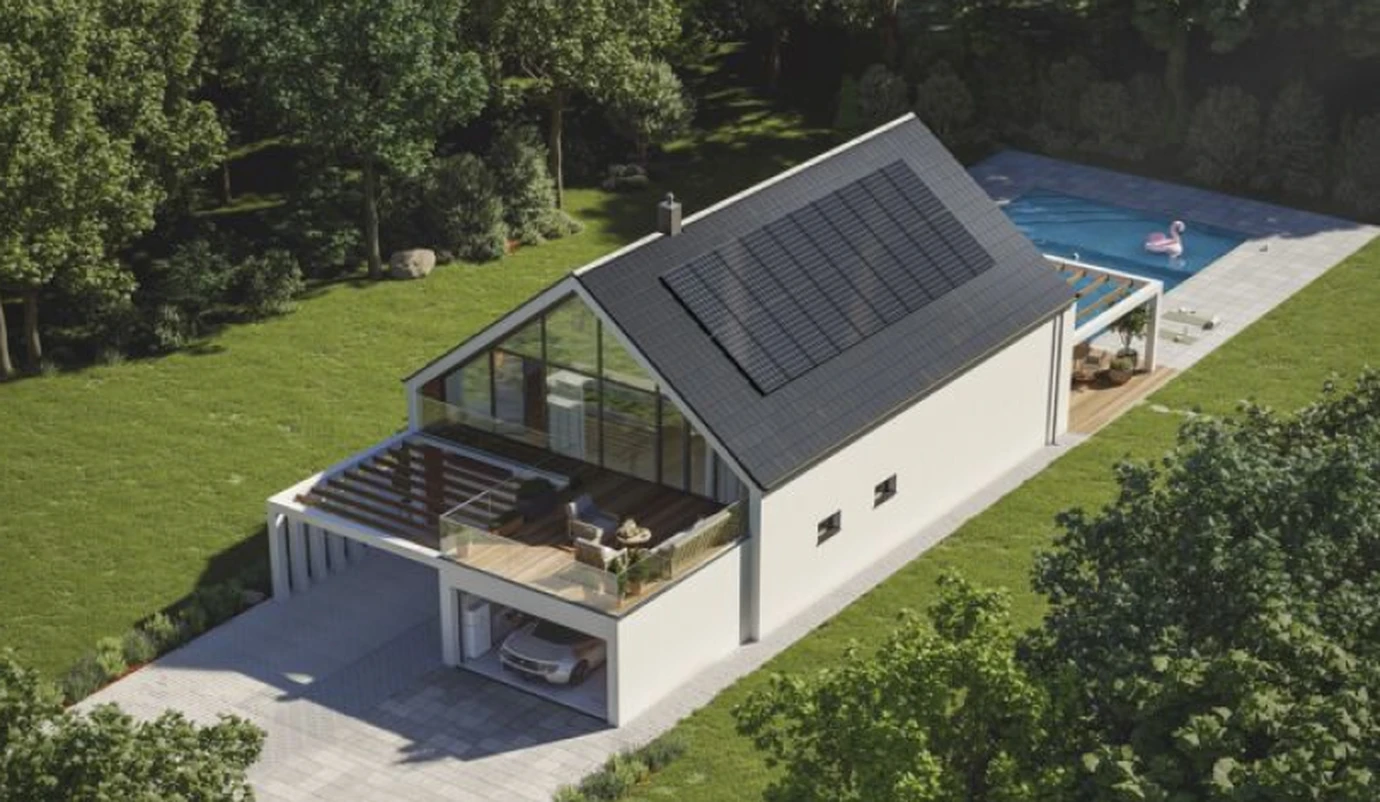
1. Maxeon 6: Best Efficiency
- Cost: $2.84/W
- Efficiency: 22.8%
- Warranties: 40-year performance at 88.3% & 40-year product
Maxeon’s 440-watt solar panel is our pick for best overall. It’s the most efficient panel at 22.8% and comes with the longest warranty (40-year performance and product warranties—15 years longer than the industry standard). Maxeon is the highest-rated solar panel on the EnergySage Marketplace.
The biggest downside to Maxeon solar panels is the price tag. At $2.84 per watt, it’s one of the most expensive brands available. Its specs are stellar, but if budget is your priority, you can likely find a cheaper panel that still meets your efficiency needs.
What customers are saying about Maxeon panels
“My panels were installed in April 2023. I paired them with Enphase IQ8A’s and they put out a TON of power. On a hot summer day, each panel is putting out almost 380 watts per panel, which I’m very happy with. I bought Maxeon panels because they are the most reliable panels with their unique cell design that is different than anyone else’s on the market. And surprisingly, the pricing I got was actually less expensive than some higher-end panels like REC AlphaPure and Panasonic Evervolt. Would highly recommend!” -mattjohnson5456, EnergySage (edited for grammatical clarity)
“After extensive analysis and also moderately extended experience, I can say the Maxeon panels truly are an incredible, high performing, highly reliable and durable panel.” -guywthclss, Reddit (edited for grammatical clarity)
2. VSUN 490 N: Most power output
- Cost: $2.43/W
- Efficiency: 22.65%
- Warranties: 25-year performance at 87.4% & 25-year product
VSUN panels are a strong panel option for homeowners seeking high-power output, delivering an impressive 490 W for power—among the highest in the residential market—with a solid 22.65% efficiency rating that competes with top brands.
What sets VSUN apart is its larger-format panel that maximizes power density. Because its panels are larger, you may need fewer of them for your roof, which may lower the cost of your purchase and installation. It’s an attractive choice for homeowners who have big roofs and want fewer, more powerful panels.
That said, the size of the VSUN panel is also its downfall—they may be too big for some roofs with smaller spaces. Also, the panel’s temperature coefficient is higher than premium competitors—which means they don’t work as well in hotter temps—making these panels a less viable option for homeowners in hot climates.
What customers are saying about VSUN panels
“High efficiency, affordable, and a very high energy output. 30-year production guarantee as well as a 25-year materials warranty. Who could ask for anything more from their solar panel?” -danieljones, EnergySage (edited for grammatical clarity)
“VSuns are extremely reliable and outperform many of the ‘big name’ higher-cost panels in every category.” Dantastic0622, Reddit
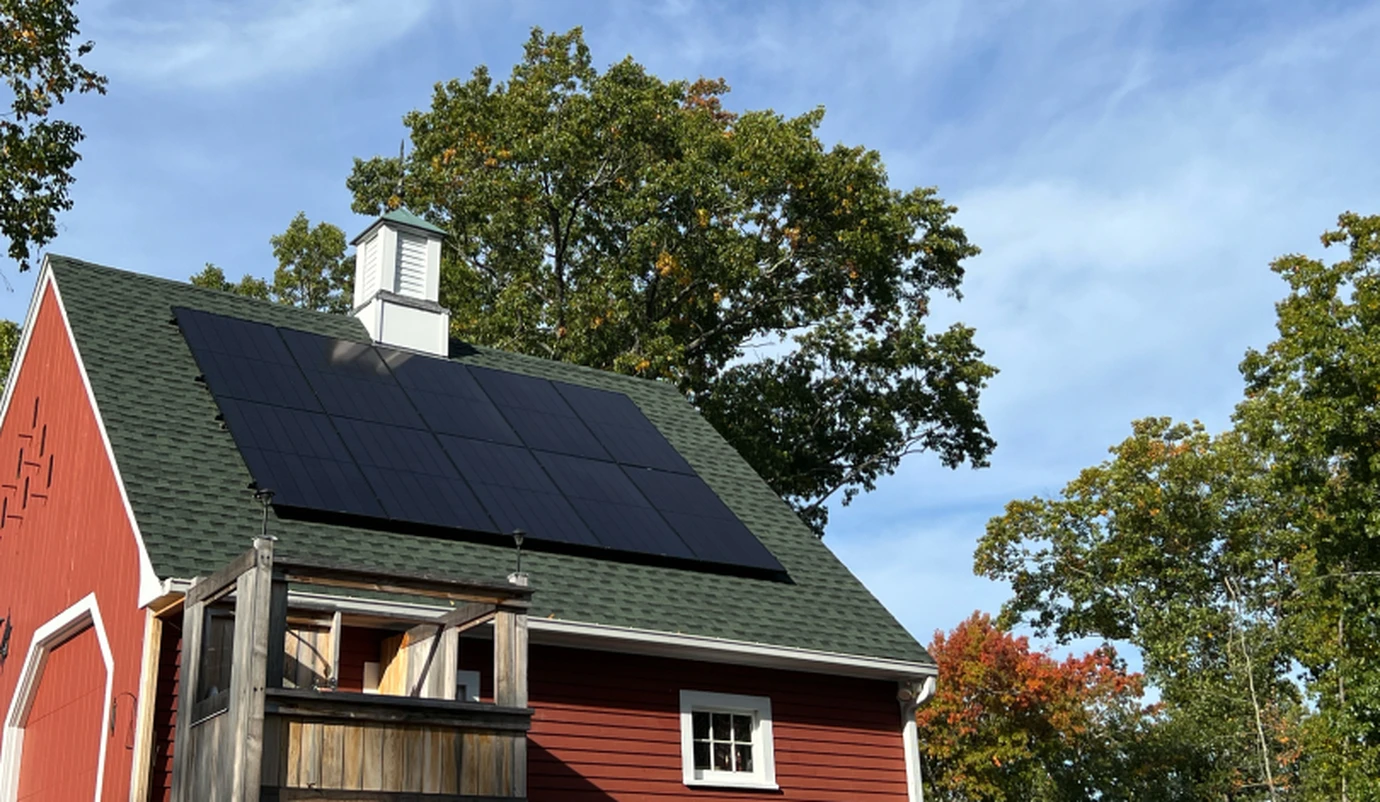
3. REC Alpha Pure: Best for hot climates
- Cost: $2.53/W
- Efficiency: 22.2%
- Warranties: 25-year performance at 92% & 25-year product
REC is a longtime favorite among EnergySage shoppers, probably because of its relatively low price per watt and impressive specs. Out of our top brands, REC offers the best bang for your buck: The Alpha Pure 410-watt panel maintains efficiency above 22%, and it has solid 25-year performance and product warranties. These panels also have one of the lowest temperature coefficients on the market, which means they perform better in hotter temperatures compared to other panels.
REC does the best job of balancing top-tier specs and affordability, but it falls short of Maxeon in terms of efficiency. We’re also hearing from installers that REC is experiencing supply shortages, so it may be hard to get your hands on these panels if you’re planning to install your system in time to claim the tax credit.
What customers are saying about REC panels
“Really happy with the great technology from REC. They have the best panel on the market and their 25+year history in the solar industry is really important to me.” -gdavissolar
“Simply put, the Alpha series panel is the best in the market right now. Being a solar consultant for the past 8 years has afforded me the opportunity to learn about panels in a detailed way. The Alpha series matches or beats SunPower in every metric there is, and its costs don't come close to the astronomical price point SunPower demands. I have 38 of these bad boys cranking out power here in Vegas, and I couldn't be happier.” -Tgibs0807, EnergySage (edited for grammatical clarity)
4. Qcells QTRON BLK 435W: Best American-made panels
- Cost: $2.48/W
- Efficiency: 22.5%
- Warranties: 25-year performance at 90.6% & 25-year product
Qcells is a quality solar panel brand, delivering solid performance comparable to industry leaders. Its 22.5% efficiency exceeds REC, while its robust 25-year performance and product warranty offer peace of mind. Qcells may be especially attractive to homeowners for its sleek all-black aesthetic, competitive pricing, and being made in America—the company has two large facilities in Georgia.
While Qcells panels are a solid all-around option, they don’t lead in any of the performance categories and fall slightly behind in terms of power output.
What customers are saying about Qcells panels
“I had my system installed in January 2022. Here in Florida, my [panels] make around 100kwh on a full sun day in May through August. I haven't had 1 issue. My highest production day last year was 100 kWh, also, so just glancing at it, I feel degradation first year is less than 2%. It's June 2023 now, and the system has already made 10.2 mWh. I'm super happy with the panels. Hope this helps you make a panel decision. I can't rate [REC’s] services as I haven't needed them.” -timhugheseternal, EnergySage (edited for grammatical clarity)
“My system—17.32kWdc—has been running since May 30th, 2023. It's high quality and zero issues thus far. Very happy with my system and the Home Team Energy Installer in my area.” -khanghulam, EnergySage(edited for grammatical clarity)
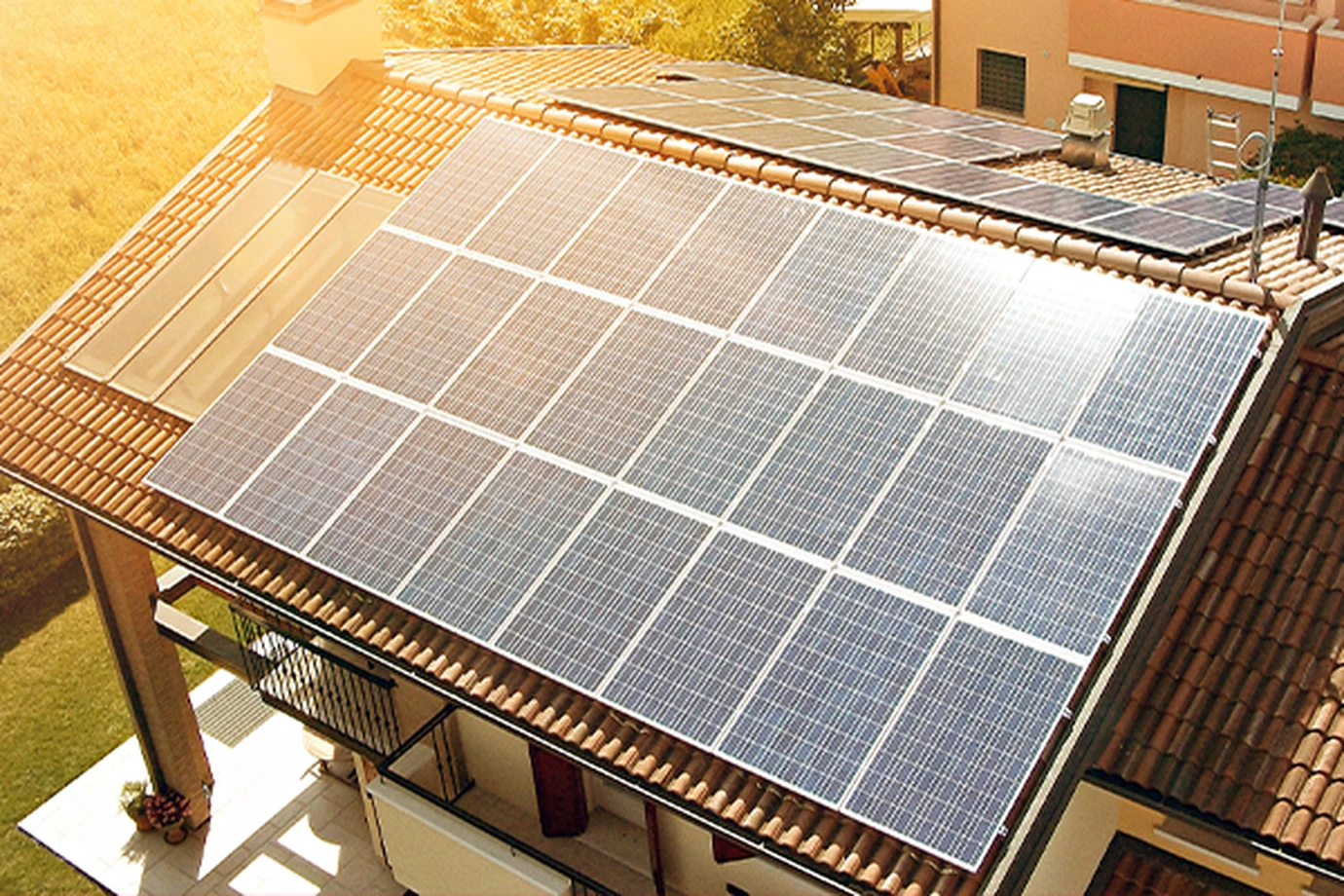
5. Canadian Solar TOPHiKu6: Powerful output
- Cost: $2.56/W
- Efficiency: 22% efficiency
- Warranties: 30-year performance at 87% & 25-year product
Canadian Solar’s TOPHiKu6 450-watt solar panel has the highest power output of the products on our list, which means it has the capacity to generate more electricity. While it’s the least efficient of our top brands, it boasts impressive performance specifications with a 22% efficiency rating and -0.29%/°C temperature coefficient. Plus, despite its name, Canadian Solar manufactures some of its panels in the U.S.
While Canadian Solar is pretty strong overall, it falls slightly behind the top three in terms of performance and is relatively expensive at $2.56 per watt.
What customers are saying about Canadian Solar panels
“I had the panels installed on the back of my house 2 years ago. They are doing everything they should do and nothing they shouldn't. Output has been a bit above expectations, and they have been completely reliable. I have 39 panels in place and have not had an issue with any of them. We have had some rough weather, and they have come through it just fine. I would absolutely buy them again.” - mcgrathdw, EnergySage (edited for grammatical clarity)
“Canadian Solar offers the best solar panels money can buy. They are highly efficient and aesthetically pleasing.” -peter, EnergySage(edited for grammatical clarity)
Honorable mention: Jinko Solar Tiger Neo: Competitive efficiency
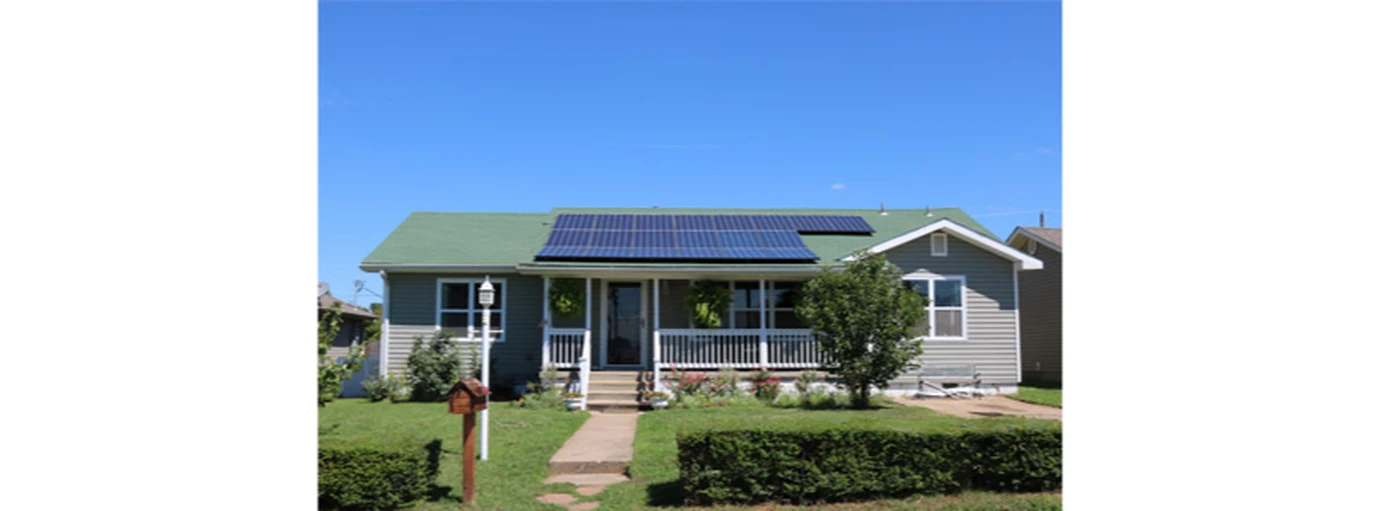
- Cost: $2.67 per watt
- Efficiency: 22.02%
- Warranties: 30-year performance at 87.4% & 25-year product
The Jinko Solar Tiger Neo 440-watt gains an honorable mention for its solid specs and strong warranties. Plus, Jinko Solar panels are reliable and will deliver electric bill savings.
Jinko didn’t rank first in any category and is the second most expensive panel on this list. It’s a great option compared to most panels on the market, but it lands sixth place when up against the others mentioned here.
How we developed our best solar panel ranking
Our team evaluated thousands of solar panel models from hundreds of manufacturers quoted through the EnergySage Marketplace. Here’s how we compare them:
Performance
The best way to assess a solar panel's performance is to look at its efficiency, output, and temperature coefficient.
Efficiency
Efficiency measures how well solar panels convert sunlight into electricity. If the sun shines on a solar panel with a 20% efficiency rating, 20% of the sun's energy will convert to solar energy in ideal conditions. The higher the efficiency rating, the better.
Output per square foot
Power output refers to the amount of electricity a solar panel generates under standard test conditions. For solar panels, this is typically expressed in watts (i.e., a 400-watt solar panel). But not all 400 W solar panels perform the same. To rank our solar panels, we primarily looked at power output per square foot. This metric is the best way to directly compare solar panels side-by-side since they can vary so much in size.
Temperature coefficient
Solar panels are like most other electronic equipment: They operate most efficiently in cool temperatures (ideally around 25° C or 77° F). A solar panel's temperature coefficient measures how much or how little its production drops in hot temperatures. The lower its temperature coefficient, the better it will perform.
For every degree above 25° C (or 77° F), your solar panel's electricity production will decrease by the temperature coefficient. For example, if your panel's temperature coefficient is 0.35%/°C, for every one-degree temperature increase above 25°C (77°F), its electricity production will decrease by 0.35%. If its temperature rises to 35°C (95°F), its electricity production will drop by 3.5%.
Warranty
A solar energy system is a significant investment. Choosing a solar panel with a strong warranty is one of the best ways to feel confident that your system will pay off in the long run.
Product warranty
Your solar panel's product warranty (sometimes called the materials or equipment warranty) guarantees the manufacturer will replace your panel if it fails due to manufacturing defects or environmental issues within a specific timeframe. Today, most solar panels come with a 25-year product warranty.
Performance warranty
A performance warranty guarantees that your panels will produce a certain percentage of their original output by a specified warranty term. Most solar panels offer performance warranties above 80% by year 25. The best are around or above 90%.
Labor & workmanship warranty
You may also see labor included in your solar panel's warranty. The conditions of a labor warranty vary significantly from brand to brand and will likely depend on you choosing an installer that your solar panel company authorizes. It's also possible that your installer will offer their own workmanship warranty covering labor components should one of your panels fail.
Durability
Solar panels spend their entire functional lives outdoors, subject to everything nature throws at them. A solar panel's durability measures its ability to perform at maximum capacity in conditions that diminish optimal performance.
You'll want to invest in durable solar panels that you can trust not to break or malfunction in the elements. Manufacturers put solar panels through several standardized tests to determine their durability:
- Damp Heat test: Measures resistance to humidity
- Thermal Cycling: Measures resistance to temperature fluctuations
- Mechanical Stress Sequence (including static and dynamic loading): Measures resistance to weight or pressure
Your solar panel's durability directly impacts its efficiency: The most durable solar panels have the lowest degradation rates, enabling them to maintain their efficiency ratings.
Price
The average 11 kW solar panel system costs $20,552 after federal tax credits. That's a lot of money. It's important to choose solar panels that are high quality and affordable. The best way to evaluate if you're getting the best bang for your buck is to divide your solar panel's power per square foot (W/sq ft) by its cost per watt ($/W). The higher this value, the more power per penny you get.
Top 10 solar panels, compared
| Brand | Model | EnergySage Score |
Efficiency | Power output |
Size | Power per square feet |
Temperature coefficient |
Product warranty |
Performance warranty |
Average cost per watt* |
Value (W/sq ft/$/W) |
|
|---|---|---|---|---|---|---|---|---|---|---|---|---|
| 1. | Maxeon | Maxeon 6 | 100/100 | 22.8% | 440 W | 20.79 sq. ft. |
21.16 W/sq. ft. |
-0.29%/°C | 40 years | 88.3% at year 40 (92% at year 25) |
$2.84 | 7.45 |
| 2. | VSUN | VSUN 490N | 86/100 | 22.65% | 490 W | 23.3 sq. ft |
21 W/sq. ft |
-0.30%°C | 25 years | 87.4% at year 30 |
$2.43 | 9.59 |
| 3. | REC | Alpha Pure | 84/100 | 22.2% | 410 W | 19.91 sq. ft. |
20.59 W/sq. ft. |
-0.26%/°C | 25 years | 92% at year 25 |
$2.53 | 8.2 |
| 4. | Qcells | Q.TRON BLK M-G2+ |
82/100 | 22.5% | 440 W | 21.02 sq. ft. |
20.93 W/sq. ft. |
-0.30%/°C | 25 years | 90.6% at year 25 |
$2.48 | 8.44 |
| 5. | Canadian Solar |
TOPHiKu6 | 81/100 | 22% | 450 W | 21.97 sq. ft. |
20.48 W/sq. ft. |
-0.29%/°C | 25 years | 87.4% at year 30 (89.4% at year 25) |
$2.73 | 8.05 |
| 6. | Jinko | Tiger Neo | 75/100 | 22.02% | 440 W | 21.51 sq. ft. |
20.46 W/sq. ft. |
-0.29%/°C | 30 years | 87.4% at year 30 (89.4% at year 25) |
$2.82 | 7.26 |
| 7. | Hyundai Energy Solutions |
HiN- T435NF(BK) |
74/100 | 22.23% | 435 W | 21 sq. ft. |
20.7 W/sq. ft. |
-0.30%/°C | 25 years | 87.4% at year 30 |
$2.53 | 8.18 |
| 8. | Silfab | Prime NTC | 70/100 | 22.1% | 430 W | 20.99 sq. ft. |
21 W/sq. ft. |
-0.30%/°C | 25 years | 89.3% at year 30 (90.8% at year 25) |
$2.67 | 7.86 |
| 9. | Sirius Solar |
MBB HC | 66/100 | 21.25% | 415 W | 21.02 sq ft |
19.7 W/sq. ft. |
-0.30%/°C | 25 years | 87.2% at year 30 |
$2.13 | 9.25 |
| 10. | Trina Solar |
435W | 64/100 | 21.8% | 435 W | 21.51 sq. ft. |
20.2 W/sq. ft. |
-0.30%/°C | 25 years | 89% at year 25 |
$2.33 | 8.67 |
*Prices reflect the average quoted price for each solar panel brand based on EnergySage Marketplace data. Prices may differ for the specific model listed.
How to choose the best solar panels for your home
Even the best solar panels may perform poorly in difficult conditions. Some panels are better suited for small spaces, while others excel in hot temperatures. That’s why it’s so important to consider your roof, household electricity use, and climate when choosing solar panels for your home.
An experienced, local solar installer knows how solar performs in your area and can properly inspect your roof to recommend the best panels. But if you want to start some of the research, here are some things to think about:
Your roof's sizing and shading
Have a small roof with a lot of shading? You'll probably want a very powerful solar panel (unless you use very little electricity). Even light shading can reduce your solar panels’ output by 50% or more. Look for solar panels with high power output and high efficiency.
If you have a complex roof with a lot of small, awkward spaces, we recommend selecting a small solar panel that still offers a lot of power.
Your region and climate
It's no secret that solar panels are more prevalent in the Sun Belt than in other parts of the country, but they're also an excellent investment if you live in the Northeast or Midwest. You just need to choose the right panels. Your region and climate influence the performance of your panels— things like sun power, shading, panel orientation, temperature, precipitation, wind, dust, and dirt play a role.
If you live in a place that sees a lot of rain, snow, or other cloudy conditions, you’ll want high-output and high-efficiency panels. If you live in a hot and sunny region, you're in a prime spot for premium solar panel efficiency and will want to pay attention to temperature coefficient as a leading factor in your decision-making.
How to find the best solar panels for your home
If your roof is small and you don't have a lot of space for your system, investing in the most efficient, highest-performing panels can get you the performance you need. If you have enough room for a larger system, installing slightly less efficient panels could provide ample output at a competitive price.
But at the end of the day, going solar now, while you can claim the residential tax credit, will lead to greater savings than waiting for the perfect solar panel. If federal clean energy tax credits are eliminated, the cost of solar and electricity will rise, which means even a few months could mean missing out on thousands of dollars in savings.




